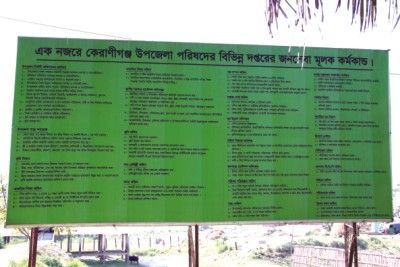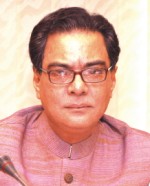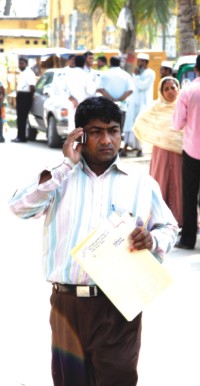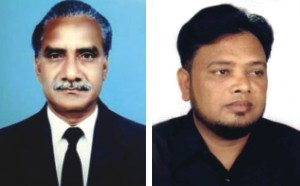Nader Rahman
The road to local government has been uncertain even at the best of times. Barely a week ago there was talk of resuscitating the Upazila Parishad Act, 1998, and keeping the supreme power with the MP's. In the end better sense prevailed and just as people had given up hope the government surprised us. The power was handed back to the elected upazila parishad leaders, though with some constrains, with MP's acting as advisors, rather than rulers. Yet questions still remain as to how the MP's will behave as and there is no clear demarcation of their powers and activities. This week we look at the history of upazila parishads from their inception, to Supreme Court rulings the controversy over article 25, as we also analyse how the new local government system will work.

The system of upazila parishad elections can be traced back to the early 80's, when H.M. Ershad decided to make local government one of his main priorities. In 1985 the first elections took place and by the early 90's there was no real barometer to measure the success or failure of the system. With a return to democracy in 1991 BNP clearly spelled out their views on the topic by scrapping upazila parishads all together. Clearly the concept was not in line with what BNP envisioned local government to be. Interestingly this is when the real problems began to surface. While upholding the governments decision to scrap the upazila parishad system, the Full Court Bench of the Appellate Division of the Bangladesh Supreme Court issued a directive which said, "With the re-appearance of Articles 59 and 60 with effect from 18 September 1991, on which date the Twelfth Amendment of the Constitution was made, these local bodies (upazaila parishads) shall have to be updated in conformity with Articles 59 and 60, read with Article 152(1) for the lawful functioning of the said local bodies…as soon as possible in any case within a period not exceeding four months from date.”
 |
A list of all the social work carried out by the offices under the Keraniganj upazila parishad. |
Those local bodies were never updated by the BNP and those four months turned into six years. By 1996 Awami League was in power and two years after taking office they passed the Upazila Parishad Act of 1998. The problem with the Act was that it overlooked the Supreme Court directive by including section 25 of the Act, which forced the upazila parishad Chairman to accept the advice of its local MP. Many viewed this move as unconstitutional but there was to be a silver lining. The Awami League government never got around to holding the elections, and by the time BNP took to office in 2001, they decided to put it on the back burner. BNP did not officially repel the act, yet essentially their actions amounted to as much. For five years they put off holding the elections swaying back and forth between the Election Commission and their own private meetings and eventually nothing was done.
 |
The entrance to one of over 450 upazila parishads in Bangladesh. |
Aside from the promulgation of an act in 1998, nothing had been done to develop local government and the upazila parishads in more than 15 years. That changed appreciably when the caretaker government came into power. While they started out as more reformist minded than they ended, it would be incorrect to say that they did not take the challenge of local government by the horns. They put together a Local Government Commission and the Upazila Parishad ordinance (2008), both which proved to be progressive and a step in the right direction. Most importantly under the caretaker government's rule a date was finally set for the upazila parishad elections. Around the country people were filled with hope that finally the local government system was being overhauled and that there would be both quantitative and qualitative change. With what seemed like a reasonably free and fair Election Commission a date was set for the upazila parishad elections after the general elections. The decision was criticised from some quarters but no one vehemently opposed it, finally the 22nd of January was set as the date local government would be reborn.
Soon after the Awami League won the elections, there was an overwhelming sense of hope that the upazila parishad elections would be held in the same free and fair manner as the general elections. The elections proved to by rocky, as there were claims of vote rigging, ballot stuffing and embarrassingly even polling stations being taken over. Fisheries and Livestock Minister Abdul Latif Biswas and Awami League law maker Abdur Rahman Bodi, allegedly got involved in the polls in Sirajganj and Cox's Bazaar, Bodi was even accused of beating up officials.
 |
Syed Ashraful Islam |
The Awami League issued statements saying that they would not protect those who broke the law and that there would be strict punishment for all involved. They next decided to drop Upazila Parishad Ordinance 2008, and disband the Local Government Commission. The move was not met with much fanfare. By dropping the Upazila Parishad Ordinance 2008, and claiming the Upazila Parishad Act 1998 could be amended, the Awami League hinted that they believed that MPs should have the final say in local government. This was the very reason the Ordinance was even created, it was made to supersede the Upazila Parishad Act of 1998 which gave the final say in local government to the local MPs. LGRD Minister Ashraful Islam said that he believed local government should be strengthened, but then in the same breath claimed the only way to do so was to amend the Upazila Parishad Act 1998, instead of enacting the well balanced Upazila Parishad Ordinance 2008. On the topic he says, "elected officials have a responsibility to act decisively for their constituents. I do not see this (amending the Upazila Parishad Act 1998) as a step backward at all. It is simply a way for members of parliament to act and participate in the best interest of the people who elected them.”
If the Awami League really does wish to amend the Upazila Parishad Act 1998 and that too only to add the positions of Vice Chairmen then who would the Act really help? It was a failure when it was first promulgated in 1998, and now by simply adding two Vice Chairmen posts how will it radically improve the local government landscape? To this Islam calmly says, "why ratify a new ordinance when an old one is in place? All we need to do is amend it and it will do exactly the same job."
 |
| The upazila parishad elections was marred with allegations of vote stuffing to taking over polling centres. |
 |
Amending the Upazila Parishad Act 1998 could be a decisive step backwards for Bangladeshi democracy. |
Dewan Zainul Zakerin, Chairmen, Sumanganj upazila, Sylhet says, "the problem with giving the MPs power over the chairmen is that the MP never really spends much of his time in his constituency. That may be where he is elected from, but most if not all of his time in spent in Dhaka to attend the Shangsahd. Thus he is separated from our problems, he is not in the locality and does not truly understand the scale and nature of what we need." The point is well taken that the MP has to spend most of his time in Parliament, but interestingly while the MP could be informed of the problems from his area, he will still not have the answers as to how to solve them, because he can not solve the problem at the local level. His thoughts are more central, he will see how the power brokers in Dhaka can help an upzaila parishad within his constitution. The need for good, decent and honest local government is that they should be able to find the answers to their problems locally, that is where the chairmen and his skills comes into play. If the problem cannot be solved locally, only then is it time to make a call to an MP to ask for help. The whole point of local governance is that the people govern and help themselves, but if the MP has supreme power over Chairmen, then the concept of local people governing themselves is lost.
The second part as to why it is such a big deal for an MP to be an advisor to a Chairman is entirely constitutional. First some assumptions must be made, the constitution is the highest law of the land and nothing supersedes it, essentially we are all bound by it. In the constitution it is clearly stated in Article 60 that, " Powers of local government bodies:
 |
| The whole point of local governance is that the people govern and help themselves. |
For the purpose of giving full effect to the provisions of article 59 Parliament shall, by law, confer powers on the local government bodies referred to in that article, including power to impose taxes for local purposes, to prepare their budgets and to maintain funds." This clearly shows that the Upazila Parishad Act 1998 disregards the separation of powers and directly contradicts the very backbone of our constitution. Gazi Abdul Hadi, Chairman, Dumuria upazila, Khulna says, "a good democracy needs a separation of power, but as you can clearly see if the MPs have their way there will be no separation of power at all. From a very practical point of view, I really don't even see why such a step is necessary. The whole point of local government is that things are done locally, let the MP sit in Dhaka and 'assist' us, there is no need for them to 'control' us." Hadi continues, "if that was the case then why elect us at all, the MPs seem very confident that they can take care of their areas, obviously we have no role to play then. But if they look at us and say they need us to assist them in carrying out their work and development activities, then they have read the constitution backwards.”
On February 23 uapzila parishand Chairmen and Vice Chairmen travelled to Dhaka to take their oath and did so without fully knowing the extent of their powers. Newspaper reports around the country speculated that a return to the Upazilla Parishad Act 1998 was imminent, and in more ways then one there was a sense of dread around the country. Roundtable after roundtable suggested that the government either amend the Upazila Parishad Act, 1998 to exclude the absolute power of MPs or simply accept the Upazila Parisahd Ordinance, 2008. The government as it seems did not turn a blind eye to the people's wishes. On Tuesday the 24th of January the government tabled a bill in parliament seeking restoration of the non-operational Upazila Parishad Act, 1998 doing away with the contentious provision that made it mandatory for the parishads to follow the lawmakers suggestions.
 |
Abdul Latif Biswas and Abdur Rahman Bodi |
The move turned out to be wiser than before, as it not only pleased the hundreds of newly elected Chairmen and Vice-Chairmen, but also showed that the Awami League was ready and willing to rise to the challenge of local government. Interestingly the bill kept the provision for MPs to be 'advisors' to Chairmen. It is not entirely clear as to why that provision was kept after the MP's power had been curtailed. Whether the move will foster a stronger relationship between MPs and Chairmen remains to be seen, as the role of the advisor is a grey area that needs to be defined clearly. But the concessions made by the lawmakers does give hope that after years of being on life support local government will may finally find a way out of the darkness into the light.
Copyright
(R) thedailystar.net 2009
